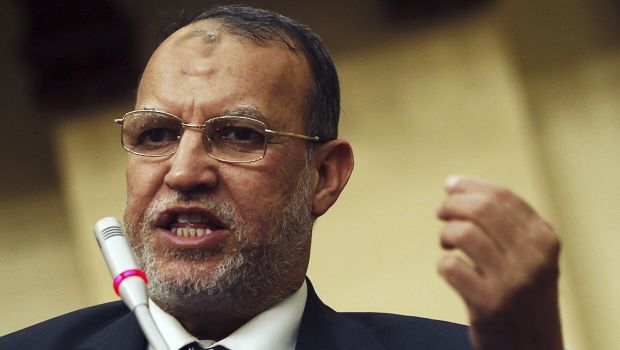
Essam El-Erian, deputy head of the Freedom and Justice Party, speaks during Egypt’s Shura Council meeting in Cairo in this May 25, 2013 file picture. (REUTERS/Amr Abdallah Dalsh/Files)
Cairo, Asharq Al-Awsat—Egyptian authorities arrested a senior member of the Muslim Brotherhood on Wednesday, a day after the judge overseeing the trial of several fellow leaders of the organization resigned over the authorities’ failure to produce them in court.
Essam El-Arian, the vice-chairman of the Brotherhood’s Freedom and Justice Party (FJP), was reportedly seized in an apartment in a northern suburb of Cairo on Wednesday morning, three months after authorities issued a warrant for his arrest in the wake of the toppling of Brotherhood-backed president Mohamed Morsi.
While on the run he issued several statements to the media calling on the public to reverse the ouster of Morsi, who was removed from office by the Egyptian military a year after being elected, amid large-scale public protests against him and the Brotherhood.
Arian is now reportedly to stand trial next week, together with several other senior members of the Muslim Brotherhood and the FJP, including Morsi himself. They are charged with inciting Brotherhood members to murder protesters outside the Brotherhood headquarters in Maqtam, south Cairo, during the June 30 protests which resulted in nine deaths and 91 injuries.
However, the judge in charge of the trial of Muslim Brotherhood supreme guide Mohammed Badie and his two deputies resigned on Tuesday. The court said the resignation was due to the Interior Ministry’s refusal to bring the defendants to court for the second hearing in succession, citing security reasons.
The court referred the case to the chairman of the Cairo Appeals’ Court, Chancellor Nabil Salib, to appoint a different court for the trial. Judge Fahmi, meanwhile, sent a message to Interior Minister Mohammed Ibrahim informing him of the importance of the defendants’ attendance at the trial when a new venue is set, adding that “lack of security could become an obstacle to all judges.”
Prosecutors had referred six defendants for trial at the Cairo Criminal Court on charges related to the deaths of anti-Morsi protesters near the Muslim Brotherhood headquarters. They were Mostafa Abdel-Azim Al-Bashlawi, Mohamed Abdel-Azim Al-Bashlawi, Atef Abdel-Jalil Al-Samri, Mohamed Badie (supreme guide) and his two deputies, Khairat El-Shater and Rashad Bayoumi. The prosecution charged the defendants of murder, attempted murder and possession of fire arms.
The prosecution alleged that Badie, Shater and Bayoumi conspired with the other three defendants to open fire on protesters in return for payment. The prosecution also alleged that they abetted the perpetrators by providing them with arms and ammunition. The defendants denied all charges, denouncing them as politically motivated.
Meanwhile, Brotherhood supporters have intensified their protests in a number of universities in preparation of the trial of ousted President Mohamed Morsi on November 4. Security sources told Asharq Al-Awsat that it was difficult to bring Morsi to the court building in Cairo’s Maadi district amid threats by his supporters to disrupt the trial.
An alliance of Islamist movements led by the Brotherhood has called on supporters of ousted President Mohamed Morsi to protest on the day of his trial. The alliance issued a statement which said “Morsi does not recognize the court which will try him and he will not appoint a lawyer, Egyptian or foreign, to defend him, because he does not recognize the trial, the charges, or any procedure by the coup authority.”
